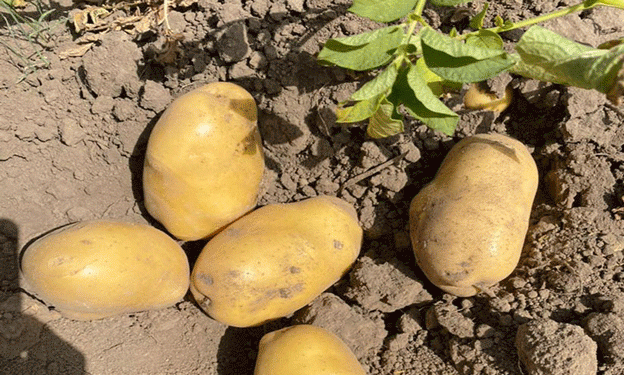Potato farming can be a highly rewarding endeavor, but as with any agricultural venture, its success is determined by key foundational choices. According to Guinean potato producer Alpha Ousmane Diallo, the most critical of these are land selection and the choice of seeds. Without careful consideration of these factors, farmers risk poor yields, pest infestations, and financial losses. In this article, we delve into Diallo’s expert advice on how to set up a productive potato crop, focusing on the role of soil, seed selection, and best practices for protecting the plants.
Choosing the Right Soil for Potatoes
The first step in cultivating potatoes is selecting the appropriate land. Diallo stresses that not all soil types are suitable for potatoes. “The potato is not a crop that can be grown just anywhere. It requires a specific environment,” he notes. Ideally, potato plants thrive in well-structured soils that provide good drainage and root aeration. Excessive moisture, such as in lowlands or marshy areas, should be avoided as it can lead to root rot and other diseases.
Potatoes grow best in soils with a pH between 6.0 and 7.0, which allows for optimal nutrient absorption. Soil salinity should also be kept low, as high salt levels can impair growth. “Testing the soil pH before planting is essential for a good start,” advises Diallo. Additionally, well-drained soils help to prevent waterlogging, which is a common issue in poorly selected sites.
The Importance of Seed Selection
Equally important is the choice of seeds. Diallo highlights that selecting the right potato variety, tailored to the local climate and market demands, is crucial for maximizing yields. He emphasizes that seeds should be adapted to both the environmental conditions and consumer preferences. For instance, some varieties may be more resistant to drought or disease, while others might produce tubers that are more appealing to local buyers.
“Good seed choice cannot be overlooked. A successful harvest begins with using high-quality, certified seed,” says Diallo. Certified seeds are often free from common potato diseases, helping farmers avoid devastating losses. In Guinea, these certified seeds are typically imported from Europe, mainly France, where strict quality controls are in place. Using certified seeds ensures higher yields and better-quality tubers, which can significantly improve profitability.
Diallo recommends that farmers adhere to proper phytosanitary practices to protect their crops. “Phytosanitary treatments, such as the use of herbicides and nematicides, are critical for minimizing growth restrictions caused by pests and diseases,” he explains. Regular monitoring of the plants and timely interventions are also necessary to control any emerging threats during the growing season.
Maximizing Yields and Market Success
When managed properly, potato farming can yield substantial returns. According to Diallo, one hectare of well-maintained potato land can produce around 800 sacks, each weighing 25 kilograms. The yield depends heavily on how well the crop is managed, particularly in terms of soil care, pest control, and irrigation.
However, achieving a good yield is only part of the equation. Successful farmers must also navigate the market effectively. “If you miss the market, you miss your campaign,” says Diallo. He advises farmers to conduct thorough market research, analyzing consumer preferences, competitors, and the overall market environment before planting. Understanding the dynamics of supply and demand helps farmers time their harvests and optimize sales.
Potato farming is a complex process that begins with two fundamental choices—selecting the right land and using high-quality seeds. By choosing well-drained, pH-balanced soils and certified seeds, farmers can lay the groundwork for a successful crop. With proper phytosanitary measures and attention to market trends, potato growers can maximize their yields and profitability. As Alpha Ousmane Diallo points out, attention to detail at the beginning stages is what sets the foundation for a successful harvest and a sustainable farming operation.







